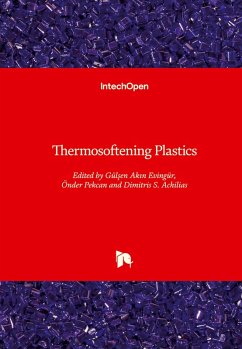Thermosoftening Plastics are polymers that can be manipulated into different shapes when they are hot, and the shape sets when it cools. If we were to reheat the polymer again, we could re-shape it once again. Modern thermosoftening plastics soften at temperatures anywhere between 65 ºC and 200 ºC. In this state, they can be moulded in a number of ways. They differ from thermoset plastics in that they can be returned to this plastic state by reheating. They are then fully recyclable because thermosoftening plastics do not have covalent bonds between neighbouring polymer molecules. Methods of shaping the softened plastic include: injection moulding, rotational moulding, extrusion, vacuum forming, and compression moulding. The scope of this book covers three areas of thermosoftening plastics, thermoplastic materials, and their characterization. The following tests are covered in the book: thermal analysis (differential scanning calorimetry, heat deflection temperature test), optical properties tests (fluorescence spectroscopy, UV spectroscopy), and mechanical properties tests (thermogravimetry, rheometry, short term tensile test).
Hinweis: Dieser Artikel kann nur an eine deutsche Lieferadresse ausgeliefert werden.
Hinweis: Dieser Artikel kann nur an eine deutsche Lieferadresse ausgeliefert werden.








